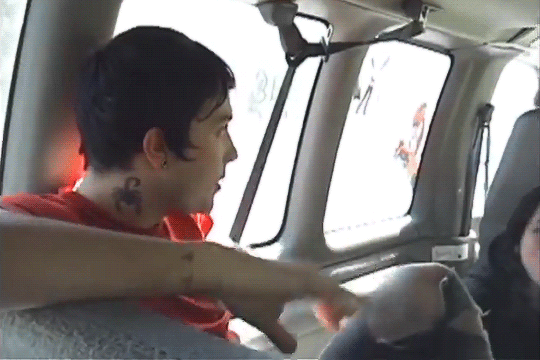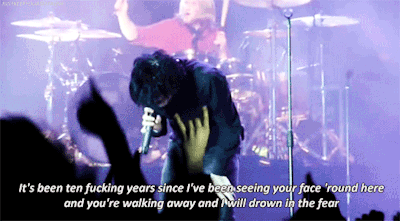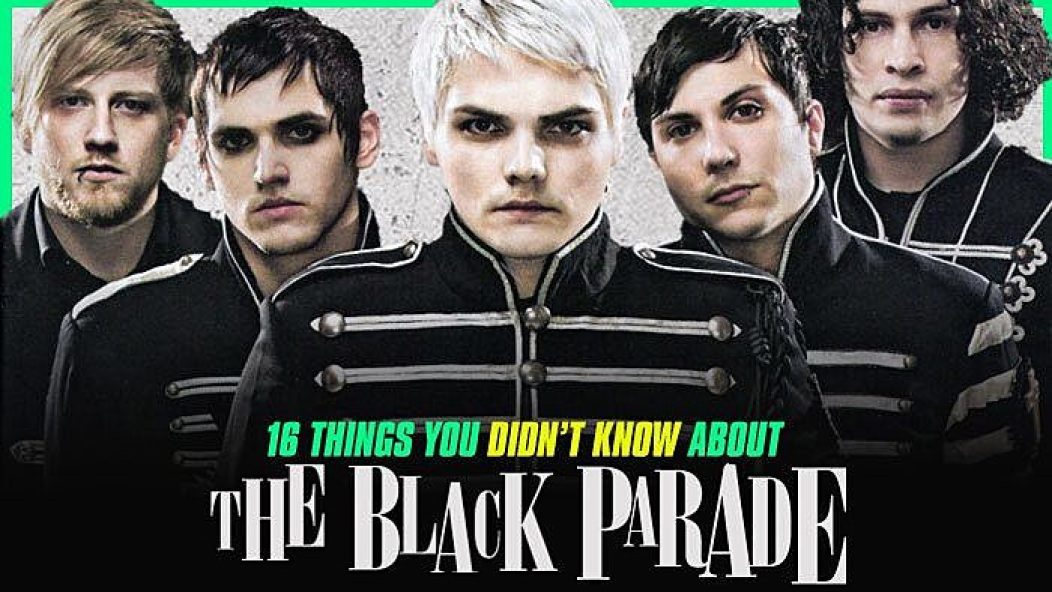
16 things about ‘Black Parade’ even My Chemical Romance probably forgot
It’s that time of year again where we realize how old we are when we remember The Black Parade was released. In the years since, My Chemical Romance’s rock opera has been immortalized as one of the greatest emo concept albums of all time, with its hidden Easter eggs and the complex universe built around it adding to its importance.
From the real meaning behind those ambiguous songs to the references you totally missed, we’ve been digging through My Chem’s famous third record to bring you the facts you probably didn’t know about this 2006 classic.
Read more: My Chemical Romance aren’t the only reunion set for Aftershock 2021
The Black Parade had many guises

The Black Parade took many forms before it became the well-rounded, theatrical rock opera we know today. Its working title changed from “The Rise And Fall Of My Chemical Romance” to the immortal title we now know. What would become “Welcome To The Black Parade” was also first demoed under “The Five Of Us Are Dying,” with a rough mix later released via 10th anniversary reissue The Black Parade/Living With Ghosts. But both previous names comply with the speculation that this third album was always intended to be their last. On top of this, the record was rewritten a total of four times. It’s just a part of the process of crafting such an ambitious concept album that has remained as relevant and timeless 14 years on from its release.
The beginning of “The End.”

Those unforgettable heart monitor beeps welcomed us into the universe of The Black Parade, and nothing would be the same again. Opening tale “The End.” armed with its sneaky reference to the drag from “You Know What They Do To Guys Like Us In Prison,” conveys the final moments of the album’s protagonist the Patient before he passes to the afterlife. Originally titled “Father” as the character calls out to his family, this narration also makes a reference to critics who told vocalist Gerard Way that he would never make anything of his life. “When I grow up, I want to be nothing at all” is one of the album’s many middle fingers raised proudly aloft.
Read more: 29 scene song titles so long you’ll have to stop to take a breath
“Dead!” doesn’t mean what you think

At the height of the “cult of emo” scare initiated in the U.K. by newspaper The Daily Mail in response to The Black Parade, “Dead!” was blasted as a blatant call to suicide. In fact, MCR wrote the track with the intention of criticizing the fickle music industry around them that made the band feel inadequate and that their achievements would amount to little. Lyrics such as “Wouldn’t it be great if we were dead?” were by no means promoting fans taking their own lives. Instead, they were a direct stab at outlets and cynics that fired ill wishes at the band for what they stood for, the fans who stood by them and the culture that evolved around them—something that lived with them even during their hiatus. Luckily for us, MCR didn’t stay “Dead!” for very long.
Mikey Way’s medal

The Black Parade’s best-kept secret surfaced earlier this year, thanks to eagle-eyed fans, and it’s been right in front of us for 14 years. Look closely at the Parade jackets the band wear in the videos for “Welcome To The Black Parade” and “Famous Last Words.” You’ll notice Mikey Way is the only member to wear a military medal. Now cast your mind back to the video for “The Ghost Of You”—Mikey’s character is the only one to die in battle. Therefore, his Black Parade alter ego wears a posthumous medal to commemorate his death in combat.
Read more: This My Chemical Romance fan wrote an unofficial ‘Black Parade’ musical
A reference to the Ways’ grandmother

After Three Cheers For Sweet Revenge referenced the passing of Gerard and Mikey’s beloved grandmother on the now-immortalized “Helena,” fans were expecting a further nod on The Black Parade to mirror that. Luckily, that mention came in the most iconic track on the album, “Welcome To The Black Parade,” and we’ve all been overlooking it for the last 14 years. Look to the very first line of the timeless song after the initial narration and you’ll find MCR’s touching family tribute to Elena Lee Rush: “Sometimes I get the feeling she’s watching over me.”
“I Don’t Love You” isn’t really about love

It’s hard to imagine the morose “I Don’t Love You” as anything but a heartbroken ode to romantic separation, a couple growing apart and parting ways with a few choice words to say as they leave. However, Gerard once confirmed that this song is in fact a scathing commentary on the fickle fandom surrounding MCR, where popular opinion could turn against them at any moment. Inspired by Cheap Trick’s attention-seeking classic “I Want You To Want Me,” seeing this song as an attack on a population who would only stand by the band when success swirled around them sheds a far darker light on The Black Parade as a whole.
Read more: Here’s why some are convinced Robert Pattinson’s Batman is an MCR fan
“House Of Wolves” has a weird backstory

The origins of the energetic “House Of Wolves” are a lot more obscure than you’d think. This track is actually inspired by a Looney Tunes short, Three Little Bops, where the wolf we know from the Three Little Pigs fable tries to play trumpet in various jazz clubs but keeps getting thrown out for playing poorly. In his attempt at revenge, he blows himself up and winds up in hell, then discovers he can play his trumpet so well that he’s able to rise up and play in the clubs that once rejected him. As weird as this connection may sound, MCR linked this tale to the Patient passing over to the afterlife, discovering The Black Parade and becoming the savior of the broken, the beaten and the damned.
“Cancer” took eight minutes to write
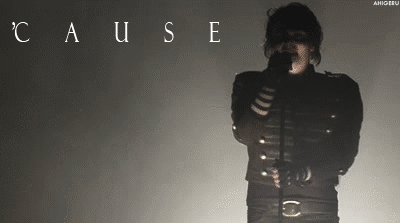
Arguably the most moving song on The Black Parade, it’s simple to assume that the heart-wrenching “Cancer” took a length of time to craft given the way it touches on its sensitive subject with care and respect. In fact, that process took Gerard and producer Rob Cavallo about eight minutes. With Cavallo on piano and Gerard singing beside him, the narrative of the Patient’s diagnosis was written in record time and recorded half an hour later. This raw composition made for an unforgettable addition to the album’s existential concept, bringing the reality of its subject as close to home as possible.
QUIZ: Is this a lyric from My Chemical Romance or a member’s project?
“Mama” was a joke all along

One of the most theatrical moments on the album, “Mama,” started out as a joke among the band in their first studio, S.I.R. Studios in New York. The crew made bets that Ray Toro couldn’t possibly write a polka in their own style, a challenge which the mastermind obviously passed. Furthermore, the band jokingly suggested Liza Minnelli as a potential star for the role of Mother War, but their team made the dream collaboration possible via satellite, and the rest is history. Moreover, the echoing voices you hear at the song’s closing feature Donna Way, Donald Way and Linda Iero, including a few unusual voices provided by Gerard himself.
Some songs were recorded on a bus
Fans may already know that the majority of the album was recorded in the ostensibly haunted Paramour Estate in California, which added a special intensity to tracks such as “Sleep.” However, the songs “I Don’t Love You,” “Disenchanted” and “Dead!” were brought to formation in the band’s purpose-built studio in the back of their tour bus during their promotional tours for Three Cheers For Sweet Revenge. The seeds for what would become a classic concept album were sown long before it came to fruition in 2006.
Read more: MCR fans think they found another return clue from the ‘Danger Days’ era
“Teenagers” has many darker meanings

Over the years, Gerard has provided fans with a plethora of meanings behind the contagious “Teenagers.” At first glance, this sassy addition to The Black Parade seems more lighthearted than its peers, but its intended subject matter is far more poignant. Gerard once suggested that this song makes a gibe at the “cult of emo” protests that surged in the U.K. in response to bands like MCR. But it was also inspired by the rise of gun and knife violence among teenagers that has made the band’s target generation more dangerous than before. Pivotally, Gerard also mentions that the track was written as an ode to the teenagers he envisages in The Black Parade, youthful figures who took their own lives because society deemed their generation as problematic.
Gerard’s hair color hints at the Patient’s mortality
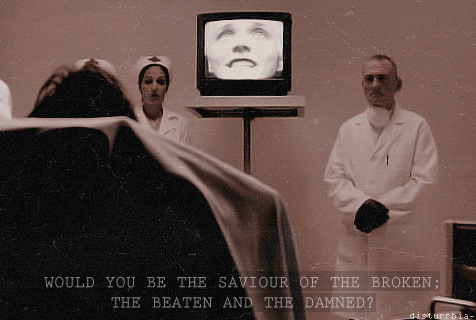
A fan theory suggests that frontman Gerard’s changing hair color is a link to the mortality of the album’s main character, the Patient. While Gerard once confirmed that he bleached his hair white to better channel the character, a form of method acting, fans have dug a little deeper. Ever noticed that G’s hair is black in the videos for “I Don’t Love You” and “Teenagers”? Those tracks convey a mortal, living story within the album’s huge concept, whereas Gerard’s hair is bleached ghostly white for “Welcome To The Black Parade” and “Famous Last Words” because those two tracks explore the Patient’s death and his transition into the afterlife.
Read more: Even more photos from that throwback Frank Iero shoot are being released
The “Teenagers” video makes a big reference

Paying tribute to another classic concept album, the music video for “Teenagers” is an almost frame-by-frame copy of the opening scenes from Pink Floyd’s musical film The Wall. Where MCR depicted high school kids breaking through a padlocked door, their interpretation of Floyd’s teenagers busting through an identical door leads to a much less dramatic end than the original, but the comparisons don’t stop there. Where the footage of teenagers running in The Wall cuts to soldiers racing to the battlefront, this comparison throws My Chem fans right back to the video of war scenes from the video for “The Ghost Of You”—referencing one of their favorite bands is nothing new for MCR.
“Famous Last Words” has plenty to say

Closing track “Famous Last Words” rounds off The Black Parade’s narrative with a bang, but the story behind its lyrics aren’t as straightforward as you’d think. Easily mistakable for a swan song for the Patient, the band confirm that this curtain call was written with Mikey in mind, as the bassist was forced to leave the recording process at the Paramour Estate to get help regarding his mental health. Full of the defiance and resilience the band wished on their friend as the narrative is “not afraid to walk this world alone,” these lyrics also strongly allude to Gerard’s difficult split with his former girlfriend at the time of the album’s recording.
Read more: This classic My Chemical Romance album just returned to the charts
The origins of “Blood”

Fans who listened to The Black Parade on CD will remember the surprise of discovering hidden track “Blood” beyond one minute and 30 seconds of silence after “Famous Last Words.” As satirical as it may sound, fans have assumed this track is a stab at the music industry that demands so much from MCR, they give their blood in return. However, the band suggested this track is a lot less serious. Instead, it refers to the numerous gory photo shoots MCR were subjected to during promotion for Three Cheers For Sweet Revenge. The boys were covered in fake blood so often for photos, in reference to the album’s crimson-streaked cover and its characters the Demolition Lovers, that this repetitive routine inspired the jaunty bonus track. Perhaps it doesn’t fit the dramatic rock opera from the rest of the album, but we still love it nonetheless.
“Kill All Your Friends” should have been on the album
The Black Parade never truly stopped at the close of hidden track “Blood,” thanks to three B-sides and bonus demos that later appeared on the album’s deluxe editions. Gerard once stated how much he regrets that the venomous “Kill All Your Friends” never made the final cut on the full album, and we agree that its existential sass deserved a place among the iconic tracks. “You can sleep in a coffin, but the past ain’t through with you” sounds like an era-defining lyric for the rock opera we know and love, so we’ll just have to pretend it squeezes in after “The Sharpest Lives” to complete the narrative.
